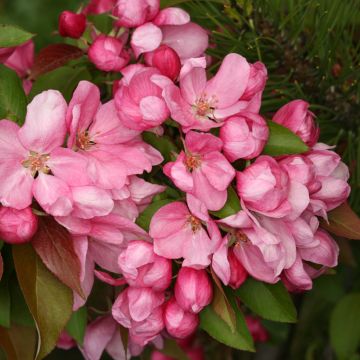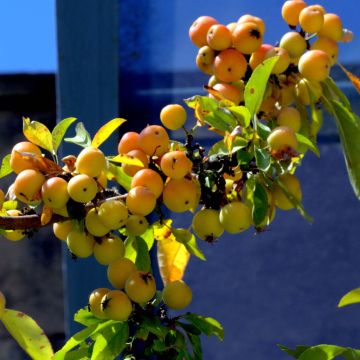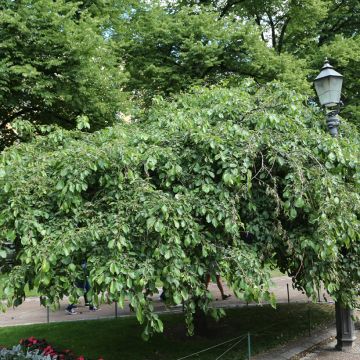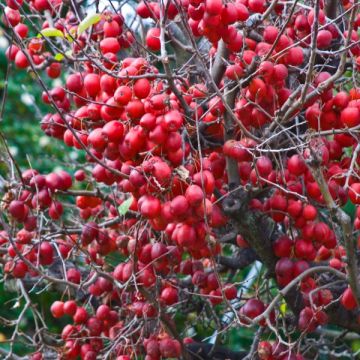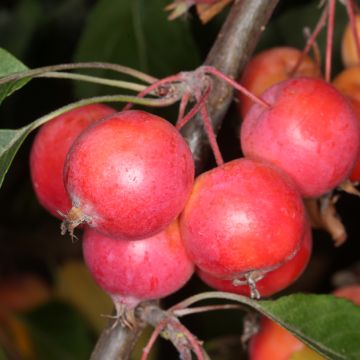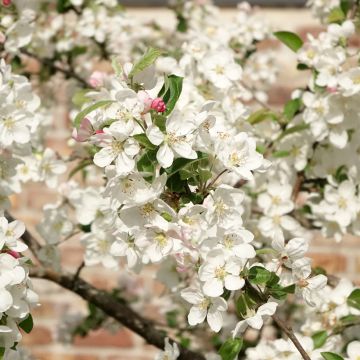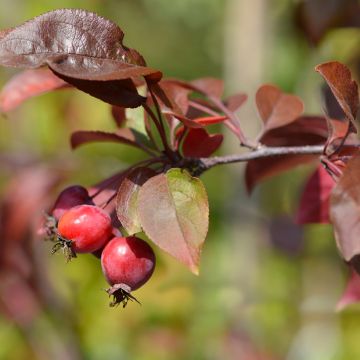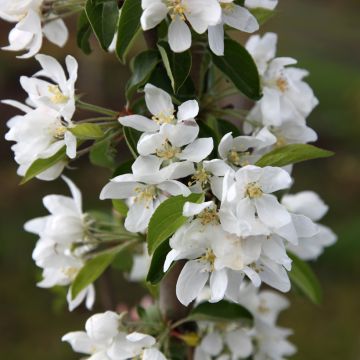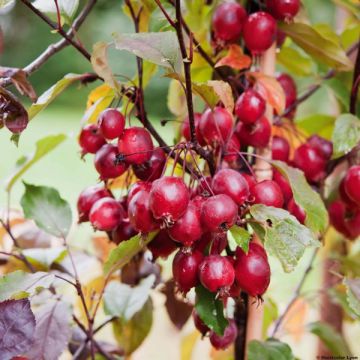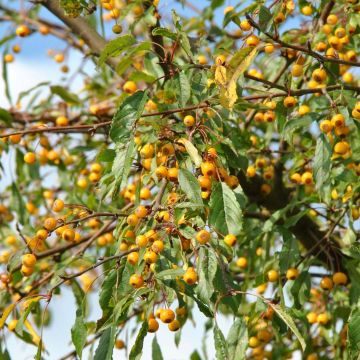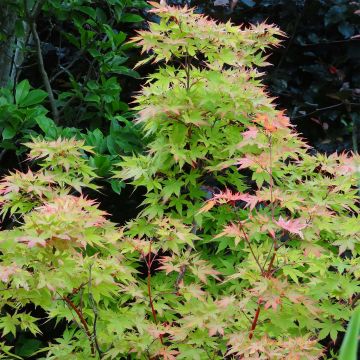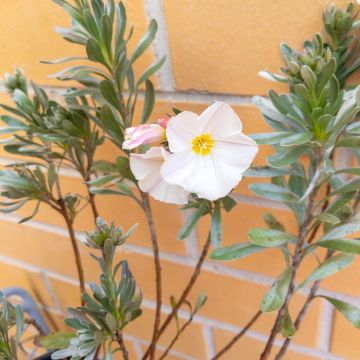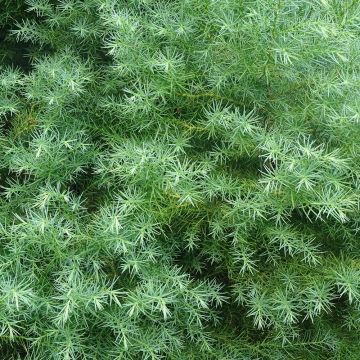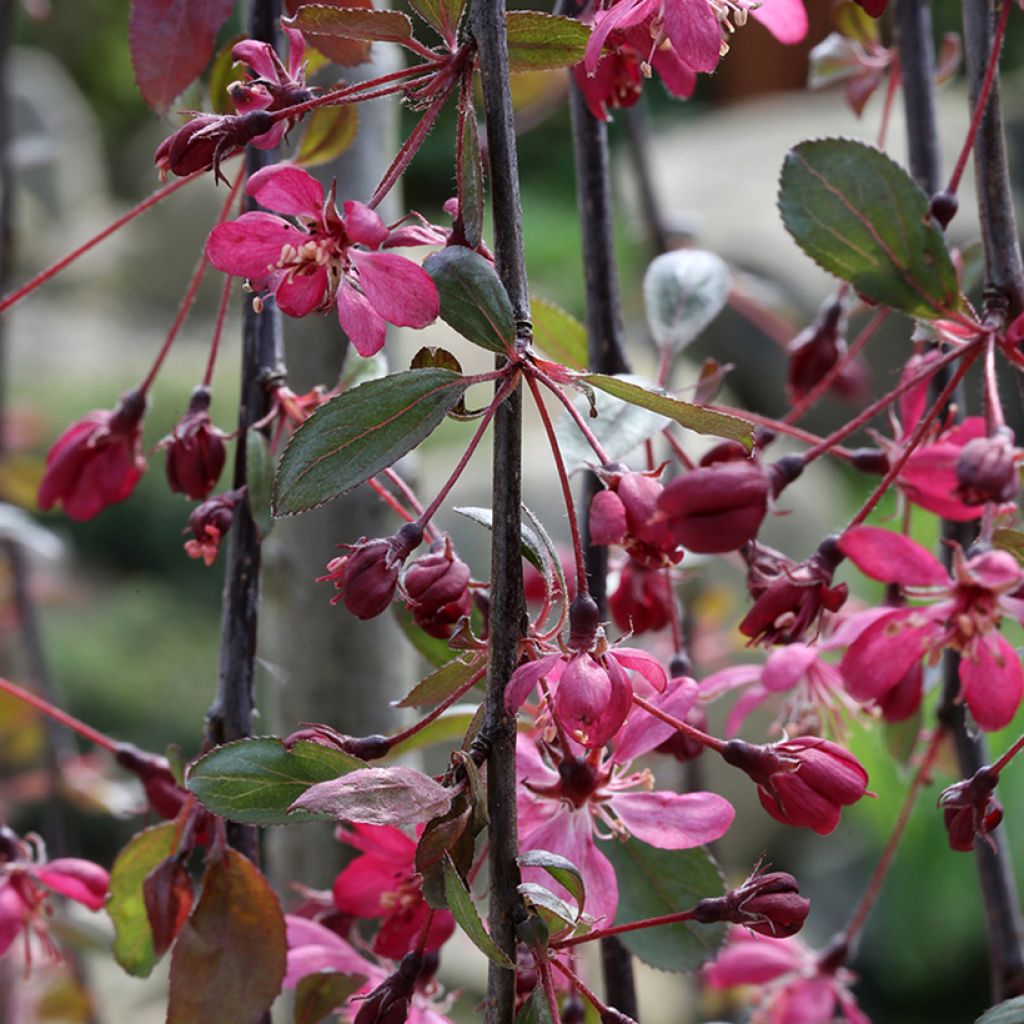

Malus Royal Beauty - Crab Apple
Malus Royal Beauty - Crab Apple
Malus Royal Beauty
Apple Tree, Crab Apple
Beautiful plant and impeccable packaging. Thank you for your delivery.
ELOI , 03/03/2024
Special offer!
Receive a €20 voucher for any order over €90 (excluding delivery costs, credit notes, and plastic-free options)!
1- Add your favorite plants to your cart.
2- Once you have reached €90, confirm your order (you can even choose the delivery date!).
3- As soon as your order is shipped, you will receive an email containing your voucher code, valid for 3 months (90 days).
Your voucher is unique and can only be used once, for any order with a minimum value of €20, excluding delivery costs.
Can be combined with other current offers, non-divisible and non-refundable.
Home or relay delivery (depending on size and destination)
Schedule delivery date,
and select date in basket
This plant carries a 24 months recovery warranty
More information
We guarantee the quality of our plants for a full growing cycle, and will replace at our expense any plant that fails to recover under normal climatic and planting conditions.

Would this plant suit my garden?
Set up your Plantfit profile →
Description
Malus 'Royal Beauty' is a particularly desirable weeping ornamental apple variety. Its naturally trailing habit forms a beautiful scene in spring when a large number of pretty single flowers appear in an intense dark pink colour. The young foliage, purple at this time of year, then changes to a dark red mixed with green in summer. Autumn is the second highlight, when the foliage takes on yellow-bronze tones and the branches bear numerous small dark red fruits clustered together. Hardy, this small flowering apple tree grows in the sun and adapts to most soils.
The ornamental apple trees come from various botanical species of the genus Malus belonging to the large botanical family Rosaceae. This family provides us with most of our temperate climate fruit trees (apple trees, pear trees, plum trees, apricot trees, peach trees, etc.) but also many ornamental plants (hawthorn, cotoneaster, rose of course, photinia, prunus...) as well as numerous wild plants that brighten up our countryside. Hardy, accommodating and easy to grow, flowering apple trees are content with ordinary soil, but prefer loamy, deep, loose and moist soils and a sunny exposure. Once established, they are low maintenance while retaining their generous character. Many cultivars have been developed, both in Europe and the United States, each bringing their own touch of uniqueness.
This flowering apple tree 'Royal Beauty' forms a small tree of modest dimensions, reaching a height of 3m (10ft) and a width of 2m (7ft) after 10 years, and at maturity (around 20 years) 4m (13ft) x 3m (10ft). Its irregular crown naturally forms a well-rounded dome, from which slender weeping branches fall to the ground. In spring, these dark purple branches produce young bronze-purple leaves, which turn to a dark red with a touch of green in summer. They are elliptical to almost lanceolate in shape, with an acuminate tip, and are of medium size, carried by medium-sized petioles. From April to May, dark pink flower buds open to reveal pretty single flowers in a deep pink colour, slightly tending towards red or purple. This extremely abundant flowering completely covers the tree, attracting attention from metres away. The flowering, visited by bees, is followed by the formation of numerous small dark red apples resembling cherry clusters. These persist on the tree until winter, after the leaves have fallen, providing food for birds. The foliage takes on a beautiful yellow-bronze colour in autumn before falling.
Malus 'Royal Beauty' is perfectly suited to small urban gardens, where it adds a touch of uniqueness without taking up too much space. It can be planted as a specimen on a lawn, or added into a bed surrounded by low plants and perennials or creeping bushes to highlight its shape. A low shrubby potentilla like Potentilla fruticosa Creamissima with very pale yellow flowers from May to September would be a good companion in a low bed. Weigela Picobella Bianco, a dwarf variety with long white flowering, can also be planted at the base of your small weeping crap apple tree, as well as thePhiladelphus Little White Love, a dwarf mock orange with highly fragrant white flowers.
Report an error about the product description
Malus Royal Beauty - Crab Apple in pictures
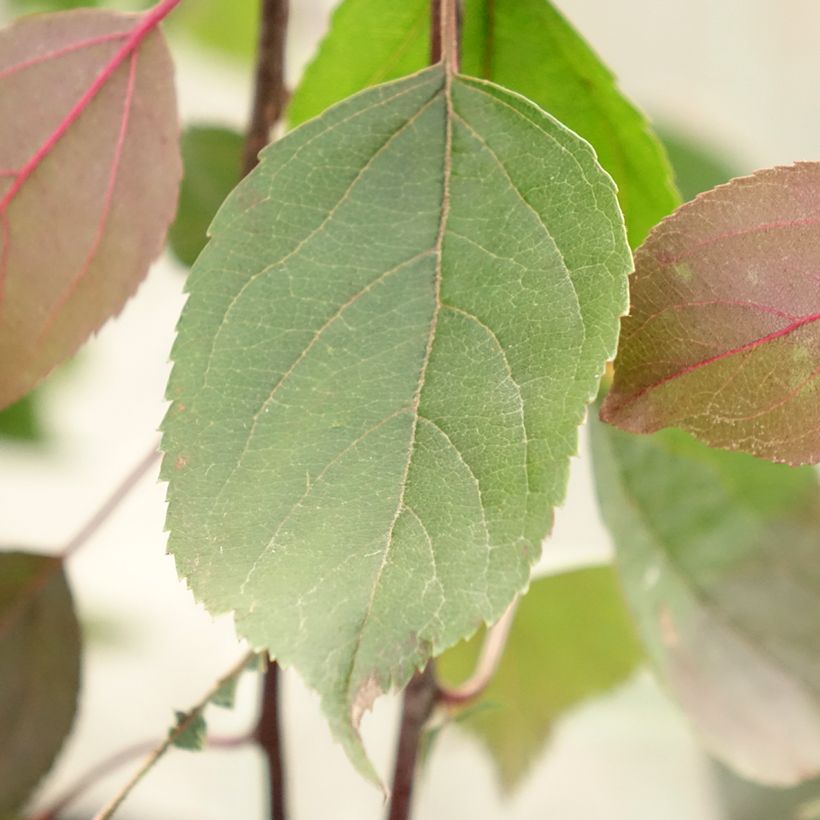

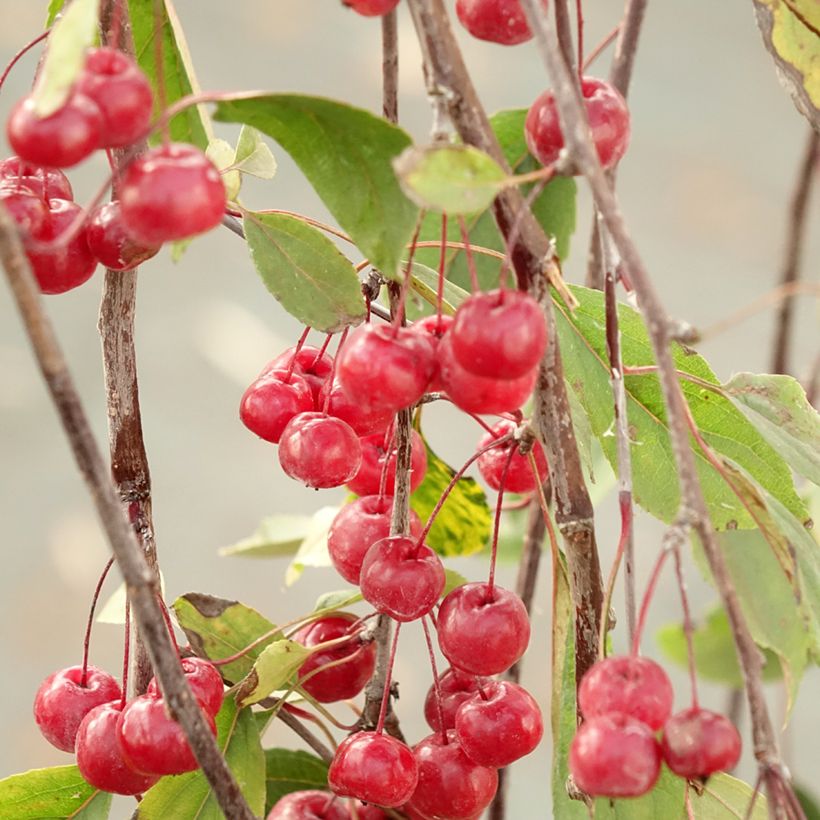

Plant habit
Flowering
Foliage
Botanical data
Malus
Royal Beauty
Rosaceae
Apple Tree, Crab Apple
Cultivar or hybrid
Other Malus - Crabapple
View all →Planting and care
Easy to grow in ordinary garden soil, Malus 'Royal Beauty' prefers a bright and sunny position to flower well, but will tolerate light shade. Ornamental Malus trees are generally very accommodating, but they like fertile, moist, and deep soil. Dig a large planting hole. If the soil is poor, add compost to the planting soil, and apply organic fertilizer or compost around its base every spring. After careful planting. water regularly during the first two years, and they then usually manage on their own. Pruning is not necessary, this flowering apple tree naturally takes on a weeping habit.
Planting period
Intended location
Care
-
, onOrder confirmed
Reply from on Promesse de fleurs
Similar products
Haven't found what you were looking for?
Hardiness is the lowest winter temperature a plant can endure without suffering serious damage or even dying. However, hardiness is affected by location (a sheltered area, such as a patio), protection (winter cover) and soil type (hardiness is improved by well-drained soil).

Photo Sharing Terms & Conditions
In order to encourage gardeners to interact and share their experiences, Promesse de fleurs offers various media enabling content to be uploaded onto its Site - in particular via the ‘Photo sharing’ module.
The User agrees to refrain from:
- Posting any content that is illegal, prejudicial, insulting, racist, inciteful to hatred, revisionist, contrary to public decency, that infringes on privacy or on the privacy rights of third parties, in particular the publicity rights of persons and goods, intellectual property rights, or the right to privacy.
- Submitting content on behalf of a third party;
- Impersonate the identity of a third party and/or publish any personal information about a third party;
In general, the User undertakes to refrain from any unethical behaviour.
All Content (in particular text, comments, files, images, photos, videos, creative works, etc.), which may be subject to property or intellectual property rights, image or other private rights, shall remain the property of the User, subject to the limited rights granted by the terms of the licence granted by Promesse de fleurs as stated below. Users are at liberty to publish or not to publish such Content on the Site, notably via the ‘Photo Sharing’ facility, and accept that this Content shall be made public and freely accessible, notably on the Internet.
Users further acknowledge, undertake to have ,and guarantee that they hold all necessary rights and permissions to publish such material on the Site, in particular with regard to the legislation in force pertaining to any privacy, property, intellectual property, image, or contractual rights, or rights of any other nature. By publishing such Content on the Site, Users acknowledge accepting full liability as publishers of the Content within the meaning of the law, and grant Promesse de fleurs, free of charge, an inclusive, worldwide licence for the said Content for the entire duration of its publication, including all reproduction, representation, up/downloading, displaying, performing, transmission, and storage rights.
Users also grant permission for their name to be linked to the Content and accept that this link may not always be made available.
By engaging in posting material, Users consent to their Content becoming automatically accessible on the Internet, in particular on other sites and/or blogs and/or web pages of the Promesse de fleurs site, including in particular social pages and the Promesse de fleurs catalogue.
Users may secure the removal of entrusted content free of charge by issuing a simple request via our contact form.
The flowering period indicated on our website applies to countries and regions located in USDA zone 8 (France, the United Kingdom, Ireland, the Netherlands, etc.)
It will vary according to where you live:
- In zones 9 to 10 (Italy, Spain, Greece, etc.), flowering will occur about 2 to 4 weeks earlier.
- In zones 6 to 7 (Germany, Poland, Slovenia, and lower mountainous regions), flowering will be delayed by 2 to 3 weeks.
- In zone 5 (Central Europe, Scandinavia), blooming will be delayed by 3 to 5 weeks.
In temperate climates, pruning of spring-flowering shrubs (forsythia, spireas, etc.) should be done just after flowering.
Pruning of summer-flowering shrubs (Indian Lilac, Perovskia, etc.) can be done in winter or spring.
In cold regions as well as with frost-sensitive plants, avoid pruning too early when severe frosts may still occur.
The planting period indicated on our website applies to countries and regions located in USDA zone 8 (France, United Kingdom, Ireland, Netherlands).
It will vary according to where you live:
- In Mediterranean zones (Marseille, Madrid, Milan, etc.), autumn and winter are the best planting periods.
- In continental zones (Strasbourg, Munich, Vienna, etc.), delay planting by 2 to 3 weeks in spring and bring it forward by 2 to 4 weeks in autumn.
- In mountainous regions (the Alps, Pyrenees, Carpathians, etc.), it is best to plant in late spring (May-June) or late summer (August-September).
The harvesting period indicated on our website applies to countries and regions in USDA zone 8 (France, England, Ireland, the Netherlands).
In colder areas (Scandinavia, Poland, Austria...) fruit and vegetable harvests are likely to be delayed by 3-4 weeks.
In warmer areas (Italy, Spain, Greece, etc.), harvesting will probably take place earlier, depending on weather conditions.
The sowing periods indicated on our website apply to countries and regions within USDA Zone 8 (France, UK, Ireland, Netherlands).
In colder areas (Scandinavia, Poland, Austria...), delay any outdoor sowing by 3-4 weeks, or sow under glass.
In warmer climes (Italy, Spain, Greece, etc.), bring outdoor sowing forward by a few weeks.






























